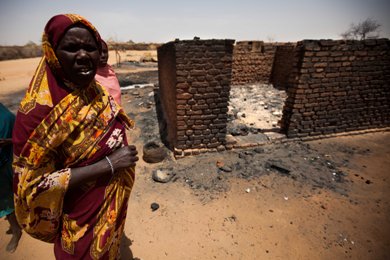Activist urges Security Council’s unity over renewal of UNAMID mandate
June 18, 2015 (KHARTOUM) – A Sudanese human rights activist called upon the United Nations Security Council to stand firm by the innocent civilians in Darfur and renew the mandate of the United Nations and African Union Mission in Darfur (UNAMID).

The Arria-formula meeting take place as the Security Council is preparing to renew the mandate of the hybrid peacekeeping operation tasked with the protection of civilians in Darfur, amid expectations that the draft resolution would reduce the activities of the mission in Western Darfur state in line with an exit strategy of UNAMID troops from Darfur.
However, Sudan, which is supported by China, Russia and several African and Arab non-permanent state members, calls for more effective and gradual withdrawal while the United Kingdom and United States maintain that the human rights situation and attacks on civilians remains unchanged in Darfur.
“The UN Security Council should not appease Bashir or surrender to his blackmailing by withdrawing UNAMID at this critical juncture of the history of Darfur that marred by unspeakable human rights violations. Darfurian innocent civilians cannot be left at the mercy of the perpetrators- President Bashir and his notorious Janjaweed’s field commander, Hemeti Daglo,” said Ahmed Hussain Adam, a Visiting Fellow at the Institute for African Development (IAD) at Cornell University.
Speaking to Sudan Tribune on Thursday Adam further said that the people of Darfur are expecting the Council to take the right decision on June 24th, “the Council should be on the right side of history by renewing the UNAMID’s mandate,” he added.
He further emphasized that the protection of the civilians in Darfur should not be politicized or subjected to a rivalry or competition among the world’s powers. He argued that, this is not about politics; this is about humanitarianism- it is about the innocent people who are in an urgent need for protection and security.
Pointing to the opposition of Darfur IDPs to the UNAMID’s exit strategy, Adam called to reinvigorate efforts to achieve a just and sustainable peace in Darfur
“Nevertheless, UNAMID also needs peace to keep. The UNSC should push for a clear and fresh roadmap for a meaningful peace and new democratic transition in Sudan. Status quo will push Sudan into more violence, chaos and further fragmentation. The Addis Ababa process under the AHUIP has failed miserably to deliver peace and credible national dialogue,” he said.
Also, he called on the Security Council to reform and enhance UNAMID’s capacity to carry out its mandate without restrictions, adding that the Sudanese army continue to bomb civilian areas and the government militiamen of the Rapid Support Forces (RSF) commit atrocities against them. He also pointed to the alleged rape of 200 women in Tabit of North Darfur.
“This is not a counter-insurgency. This is a cheap war on the civilians. This is about re-structuring Darfur demography, occupying more land and controlling the whole of Darfur,” he said.
Last week, UN secretary-general assistant for peacekeeping operations Edmond Mulet told the Security Council that the attacks by the government forces displaced 78,000 people this year. He added that there are unverified reports about additional 130,000 IDPs in Jebel Marra.
“There is also significant concern about reports of indiscriminate attacks against civilians, as well as other violations of human rights and international humanitarian law,” Mulet further said during a presentation of a periodic report about the UNAMID activities.
However, the Sudanese ambassador to the United Nations, Hassan Hamid Hassan accused the UN secretary-general assistant of seeking to provide a distorted picture about the security situation in Darfur and to attribute the displacement of civilians, caused by the tribal clashes, to the military campaign on rebel groups.
(ST)
